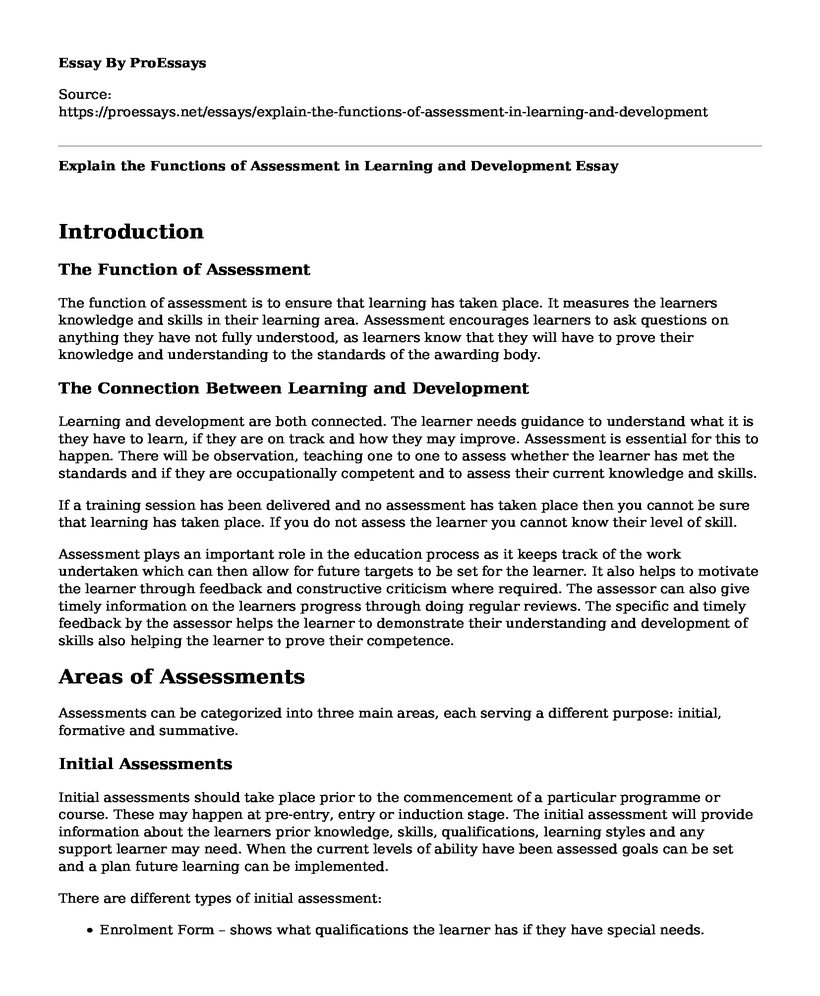Introduction
The Function of Assessment
The function of assessment is to ensure that learning has taken place. It measures the learners knowledge and skills in their learning area. Assessment encourages learners to ask questions on anything they have not fully understood, as learners know that they will have to prove their knowledge and understanding to the standards of the awarding body.
The Connection Between Learning and Development
Learning and development are both connected. The learner needs guidance to understand what it is they have to learn, if they are on track and how they may improve. Assessment is essential for this to happen. There will be observation, teaching one to one to assess whether the learner has met the standards and if they are occupationally competent and to assess their current knowledge and skills.
If a training session has been delivered and no assessment has taken place then you cannot be sure that learning has taken place. If you do not assess the learner you cannot know their level of skill.
Assessment plays an important role in the education process as it keeps track of the work undertaken which can then allow for future targets to be set for the learner. It also helps to motivate the learner through feedback and constructive criticism where required. The assessor can also give timely information on the learners progress through doing regular reviews. The specific and timely feedback by the assessor helps the learner to demonstrate their understanding and development of skills also helping the learner to prove their competence.
Areas of Assessments
Assessments can be categorized into three main areas, each serving a different purpose: initial, formative and summative.
Initial Assessments
Initial assessments should take place prior to the commencement of a particular programme or course. These may happen at pre-entry, entry or induction stage. The initial assessment will provide information about the learners prior knowledge, skills, qualifications, learning styles and any support learner may need. When the current levels of ability have been assessed goals can be set and a plan future learning can be implemented.
There are different types of initial assessment:
- Enrolment Form – shows what qualifications the learner has if they have special needs.
- Interview when you interview the learner you will be able to ask many questions.
- Diagnostic Tests will inform you if the learner has difficulty in reading or writing.
Formal Assessment
Formative assessments take place during the course and it gives the learner feedback which they can use to improve their future performance. It also allows the learner to build on their strengths and learn from mistakes by listening to the assessors feedback.
It enables progress to be regularly monitored and reviewed so that a learner can see what they need to develop further before a final assessment and identify gaps in their learning. It shows the learner how much they have learnt so far which encourages and motivates them.
Methods of Formal Assessment include:
- Tracking Sheet
- Observations
- Tutorials
- Reviews
- Oral Questioning
- Workbooks
Summative assessments
Summative assessments normally take place at the end of a unit of a course or topic. They demonstrate the extent of a learners success in meeting the performance criteria and are used to measure the intended learning outcomes of a module or programme. Summative assessment is used to quantify achievement, to reward achievement, to provide data for selection (to the next stage in education or to employment).
Methods of Summative Assessment include:
- Exit Interview
- Portfolio Completion
- Demonstration
- Summative Testing
- Evaluation Form
Cite this page
Explain the Functions of Assessment in Learning and Development. (2022, Jul 18). Retrieved from https://proessays.net/essays/explain-the-functions-of-assessment-in-learning-and-development
If you are the original author of this essay and no longer wish to have it published on the ProEssays website, please click below to request its removal:
- Essay Example on Personal Knowledge, Skills and Abilities
- Instruction and Delivery Strategies in Teaching Paper Example
- The Effect of Teaching Methods in Learning English Using the Qualitative Approach
- Causes of University Fresh Graduates to Obtain a Job in Malaysia Paper Example
- Creating an Inclusive Learning Environment for Students With Learning Challenges - Essay Sample
- Free Essay Example on Childhood vs. Adulthood: Cognitive & Social Development
- Annotated Bibliography Sample on Mobile Phones and Social Interaction: A Comparative Study of University Students







